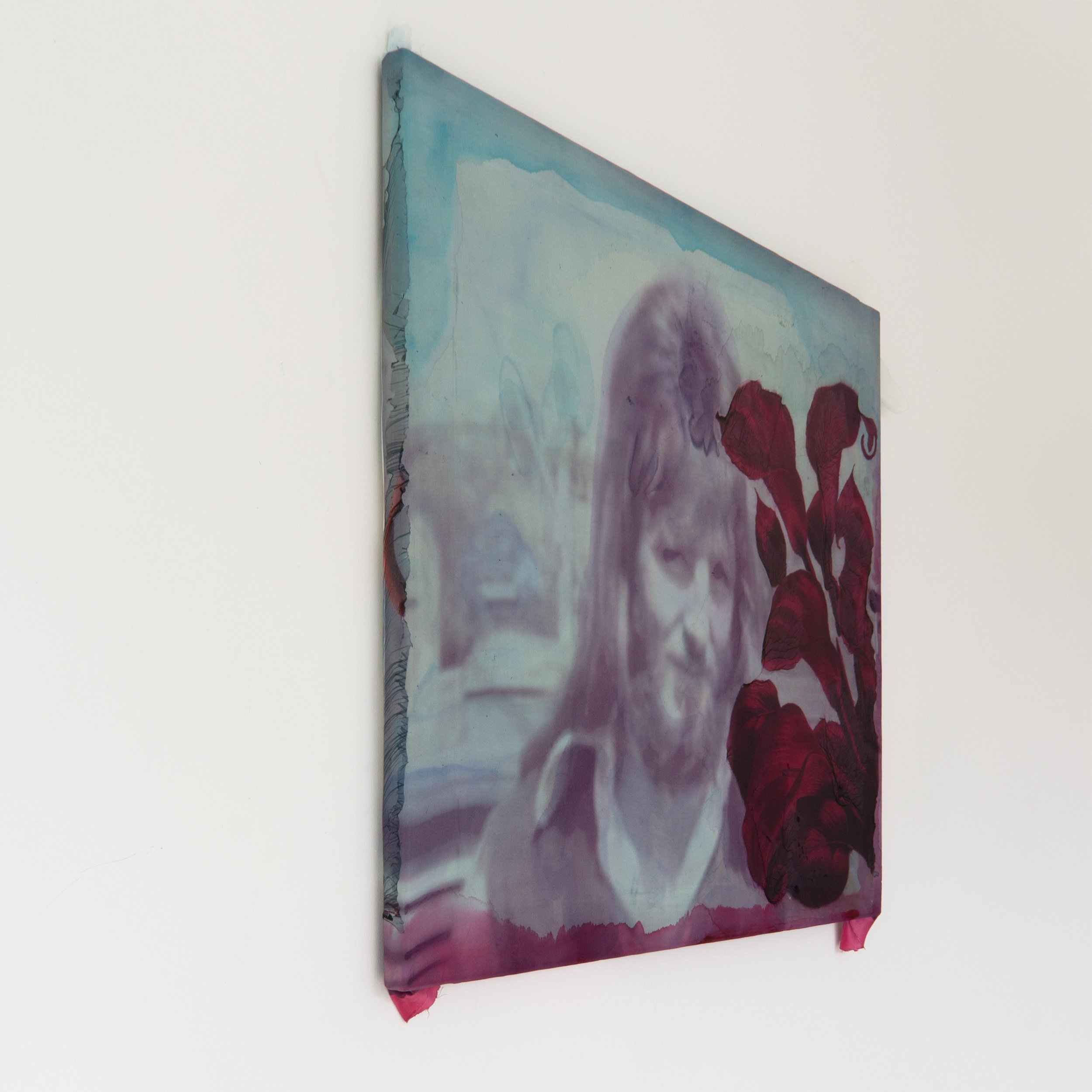 Image 1 of 2
Image 1 of 2

 Image 2 of 2
Image 2 of 2



Our Father
2025
Oil, watercolor, ink and water, photographic transfer on silk
20” x 24” / 51 x 61 cm
I was watching old Super 8mm family footage when his face appeared.
Long-haired, bearded, saintly.
I paused the projector, startled by how much he resembled Jesus. Those classic depictions you see.
Uncanny, given how my sisters and I once idolized him. Our understanding of who he was and what he believed - his devotion to Ireland’s cause and The Troubles took up so much space in our home.
Our house felt vibrant, yet tumultuous. Alive with politics, music, and descendants of Ireland - even the faintest Irish blood.
Walls covered in prisoner artwork, propaganda for a united Ireland.
Posters of the Hunger Strikers. I saw Bobby Sands' face every time I walked in and out of our front door for 17 years.
Music was always on. Rebel songs, traditional Irish music.
Sometimes he would accompany the records with his bodhrán. And my mom played the tin whistle or the spoons. Archetypal, lively and fun. We'd dance to rebel songs, chanting "H-block! H-block!" or mock Maggie Thatcher, before taking our Irish dancing lessons to the classroom stage on St. Patrick’s Day.
He took us to jails, where we’d visit Irish political prisoners. Family friends.
Summers’ end: to the Great New York State Fair, selling “Unite Ireland” sweatshirts. More posters.
Plastic bullets in a museum case. Photographs of women and babies killed by those same bullets.
Five kids. Five Easter lilies.
Our Father reflects the tension between personal identity and larger forces—cultural, political, ancestral—that frame us.
Sustained and confined by inherited ideals.
We seek unity—fractured as it may be—beneath the weight of history.
2025
Oil, watercolor, ink and water, photographic transfer on silk
20” x 24” / 51 x 61 cm
I was watching old Super 8mm family footage when his face appeared.
Long-haired, bearded, saintly.
I paused the projector, startled by how much he resembled Jesus. Those classic depictions you see.
Uncanny, given how my sisters and I once idolized him. Our understanding of who he was and what he believed - his devotion to Ireland’s cause and The Troubles took up so much space in our home.
Our house felt vibrant, yet tumultuous. Alive with politics, music, and descendants of Ireland - even the faintest Irish blood.
Walls covered in prisoner artwork, propaganda for a united Ireland.
Posters of the Hunger Strikers. I saw Bobby Sands' face every time I walked in and out of our front door for 17 years.
Music was always on. Rebel songs, traditional Irish music.
Sometimes he would accompany the records with his bodhrán. And my mom played the tin whistle or the spoons. Archetypal, lively and fun. We'd dance to rebel songs, chanting "H-block! H-block!" or mock Maggie Thatcher, before taking our Irish dancing lessons to the classroom stage on St. Patrick’s Day.
He took us to jails, where we’d visit Irish political prisoners. Family friends.
Summers’ end: to the Great New York State Fair, selling “Unite Ireland” sweatshirts. More posters.
Plastic bullets in a museum case. Photographs of women and babies killed by those same bullets.
Five kids. Five Easter lilies.
Our Father reflects the tension between personal identity and larger forces—cultural, political, ancestral—that frame us.
Sustained and confined by inherited ideals.
We seek unity—fractured as it may be—beneath the weight of history.
